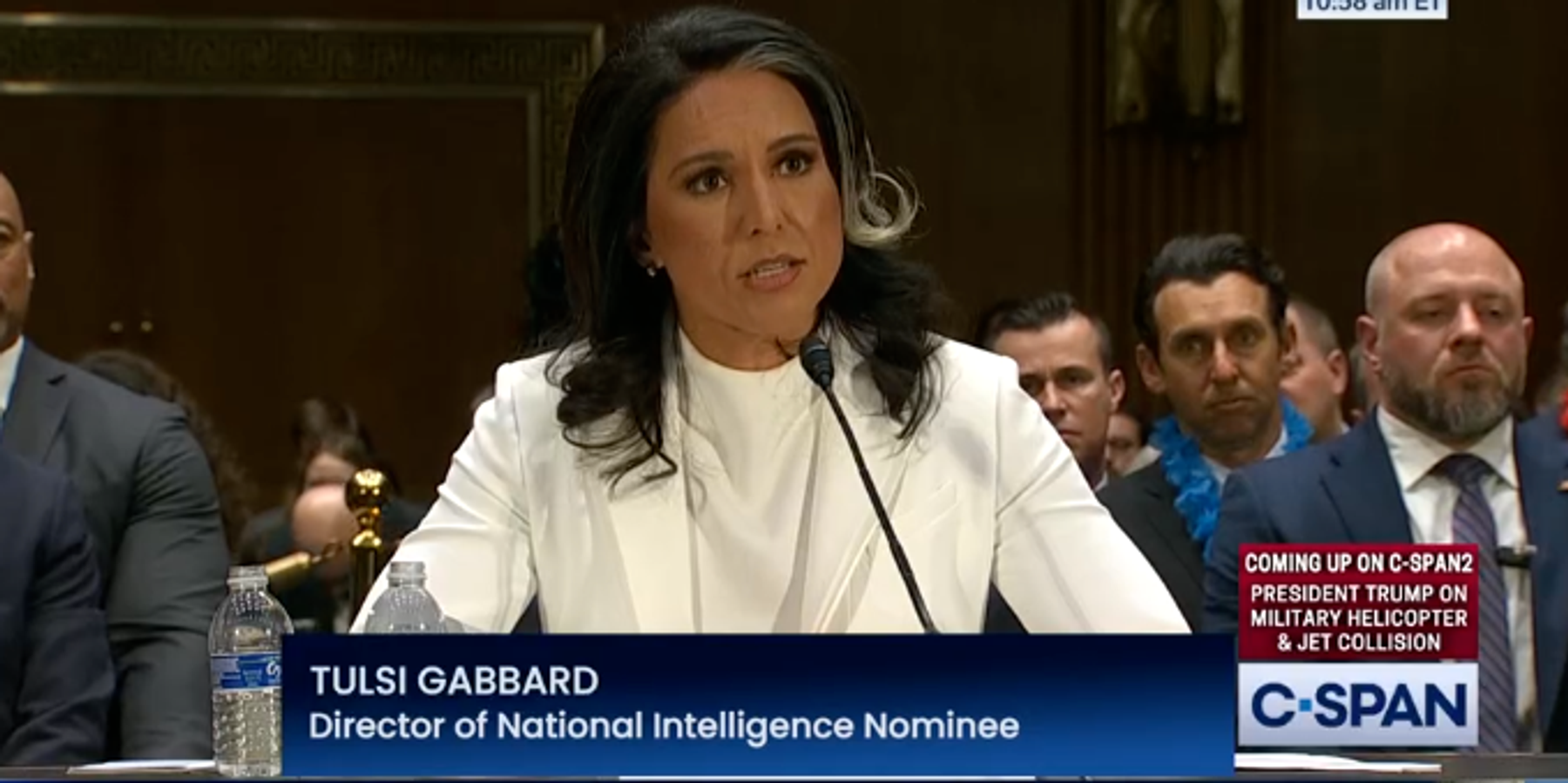Though well ensconced at home in Russia, accused leaker and U.S. defector Edward Snowden nonetheless took center stage at former Hawaii Congresswoman Tulsi Gabbard’s confirmation hearing for Director of National Intelligence (DNI) on Thursday, and frankly, he never left.
For her part, Gabbard utilized her opening remarks to focus on what she perceives would be her intelligence role, explaining that previous Intelligence Community (IC) decisions — including “failures” but also “fabrications”— have led to major foreign policy blunders, a toll on American servicemen and women, and precipitated massive human suffering.
“Our complete failure of intelligence…has led to costly failures and the undermining of our national security and god-given rights enshrined in the constitution,” Gabbard elucidated to the Senate Intelligence Committee. “The most obvious example of one of these [U.S. intelligence] failures is our invasion of Iraq based upon a total fabrication, our complete failure of intelligence. This disastrous decision led to the deaths of tens of thousands of American soldiers, millions of people in the Middle East…the rise of ISIS, the strengthening of Al Qaeda and other Islamist Jihadist groups.”
Gabbard connected such remarks to ongoing developments in Syria, citing a 2012 email where Obama's assistant national security advisor Jake Sullivan told then secretary of state Hillary Clinton that “[Al Qaeda] is on our side in Syria.”
“Syria is now controlled by al-Qaeda offshoot HTS, led by an Islamist Jihadist who danced in the streets on 9/11, and who was responsible for the killing of many American soldiers,” Gabbard explained.
Explaining that time in the military and Congress taught her "the heavy costs of intelligence failures and abuses,” Gabbard said she would "work to end the politicization of the intelligence community” and “ensure there is a clear mission focus in the IC on its core mission of…unbiased, apolitical collection and analysis of intelligence” as DNI.
As expected, senators (mostly Democrats, but Republicans, too) asked Gabbard if she supported 702 of the Foreign Intelligence Surveillance Act and repeatedly questioned Gabbard’s 2017 meeting with then Syrian president Bashar al-Assad. On the first, Gabbard reiterated that she did support the authority (a shift from her earlier position) and to the second, responded that “I believe that leaders — whether you be in Congress or the President — can benefit greatly by going and engaging with people whether they be adversaries or friends."
But beyond that, senators repeatedly slammed Gabbard’s position on Edward Snowden, a whistleblower/hero or traitor depending on who is doing the talking. Snowden had leaked thousands of classified documents exposing widespread NSA surveillance on Americans in 2013. Gabbard, working with then Florida Congressman Matt Gaetz, introduced legislation to drop Snowden’s charges in 2020.
Senators repeatedly asked Gabbard if she would call Snowden a traitor. Gabbard conceded Snowden broke the law and that she would no longer push for his pardon, but maintained he released documents critical to revealing the extent of the American government’s illegal spying on Americans. He landed in Russia on the way to asylum elsewhere in 2013 (his U.S. passport was revoked) and obtained Russian citizenship in 2022.
“Edward Snowden broke the law, and he released information in a way that he should not have,” Gabbard said in response to Senator Ted Budd’s (R-NC) questions about Snowden. “He also acknowledged and exposed information that was unconstitutional, which drove a lot of the reforms that this body has made over the years to make sure that American’s constitutional rights are protected.”’
The predominance of Snowden in the hearing was not lost on media observing the spectacle.
"Senators Michael Bennet and James Lankford and others beclowned themselves with obsessive questions about Snowden — a man who committed a crime over a decade ago but one who exposed abuses by our government," said The American Conservative's Curt Mills in the New York Times. "Their focus revealed the kind of myopia that has now twice motivated Americans to vault Trump into power."
After almost three hours of questioning, Gabbard’s confirmation process subsequently shifted to a closed door session, with a confirmation vote to be scheduled “ASAP.” Gabbard can't afford to lose one Republican vote in order for Chairman Tom Cotton to move forward from the Intelligence Committee to a full Senate vote "with confidence." As Intercept reporter Matt Sledge posited, “if Thursday’s questioning was any indication, the vote could hinge on Gabbard’s position on Snowden.”
- Tulsi Gabbard vs. the War Party ›
- Why the intel community needs Tulsi (but is too blind to know it) ›
- Sen.Cotton on Tulsi: Don't 'impugn her patriotism or integrity' ›
















